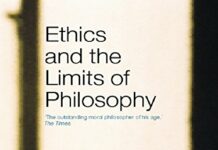
Ebook Info
- Published: 1981
- Number of pages: 188 pages
- Format: PDF
- File Size: 19.96 MB
- Authors: Bernard Williams
Description
A new volume of philosophical essays by Bernard Williams. The book is a successor to Problems of the Self, but whereas that volume dealt mainly with questions of personal identity, Moral Luck centres on questions of moral philosophy and the theory of rational action. That whole area has of course been strikingly reinvigorated over the last deacde, and philosophers have both broadened and deepened their concerns in a way that now makes much earlier moral and political philosophy look sterile and trivial. Moral Luck contains a number of essays that have contributed influentially to this development. Among the recurring themes are the moral and philosophical limitations of utilitarianism, the notion of integrity, relativism, and problems of moral conflict and rational choice. The work presented here is marked by a high degree of imagination and acuity, and also conveys a strong sense of psychological reality. The volume will be a stimulating source of ideas and arguments for all philosophers and a wide range of other readers.
User’s Reviews
Reviews from Amazon users which were colected at the time this book was published on the website:
⭐I am not qualified to really review this classic of moral philosophy by Bernard William’s since moral philosophy is not my area. It would suffice if I just say what I find interesting in this work.The most celebrated of this collection of essays is of course Williams’s original essay on moral luck which suggests a person’s deliberations in life is connected to both intrinsic and extrinsic luck.This collection of essays contains not only the celebrated moral luck essay but also some other essays of original and fascinating topics. In “Persons, Character, and Morality”, Williams discusses the conflict that the selfless abstraction demand of Kantianism impartiality, and, also of Utilitarianism’s maximal utility have with a person’s character that features individual’s life projects and concerns that he finds worth living. This conflict between morality and personal character bears on the discussion of moral luck which suggests an agent’s introspection and deliberation in life project is not always based on moral considerations alone .There are also essays on pratical necessity and a person’s character. “Practical necessity” and “Ought and Moral Obligation” discuss deliberation based on practical necessity which reveals one’s own powers and incapacities in the circumstances and external limits available to oneself. Again, luck seems to factor in even if unrelated to moral necessity.In “Conflict of Values”, Williams discusses Isaiah Berlin’s idea of a plurality of values with values not irreducible to each other. The resolution of a conflict of values brings to attention of the commensurability of values, and, of utility as a possible currency to assess all values. But there is no reason one has to accept utility as an arbiter of value conflict if one does not think appealing to another value is a proper way to resolve value conflict. Further there may not be a universal currency for the arbitration of conflict. Williams think it is also a mistake to think value conflict can be resolve by constructing an ethical theory using some rational calculus systematising moral beliefs as if value conflict is a logical affliction. William’s and Berlin’s reasoning are quite correct. If each value is different, there just can’t be an universal currency or calculus to compute how to resolve value conflict by weighing one against the other. This means value conflict can’t be resolved by moral reasoning. Answers are to be sought outside of moral calculus.”Politics and Moral Character” is an essay on integrity. What kind of character or level of integrity one wants in a politician? A politician may find himself having to do unpalatable acts in political activities such as special pleading, misleading statements, breaking promises, temporary coalition with unrespectable political party, perhaps even for preventing worthy political projects from not being actualised. The unpalatable acts may not be necessarily morally abhorrent but at least not tasteful. Williams thinks you want a politician who would be reluctant to do such acts when it is necessary in order to expect him to have much chance of not doing them when unnecessary. Certainly a very insightful observation.
⭐Bernie was in a league of his own. “Internal and External Reasons” is, without reservation, reason enough to buy Moral Luck.
⭐Bernard (pronounced BER-nerd — he’s a Brit) Williams is one of the leading Anglo-American philosophers of the late 20th century. He has written a number of seminal essays on ethics and personal identity. The essays in this collection include several of his classic pieces.”Persons, character and morality” is an insightul critique of Kantianism in ethics. Williams argues that ethics should not demand of us that we take a completely impartial view of the world. Our own personal commitments and values do, and should, make a difference to how we should act.”Moral luck” makes several challenging suggestions about the inescapability of the role of good luck in justifying some of our decisions. I am tempted to paraphrase one point Williams makes by saying, “The only difference between the genius and the fanatic is that the genius turned out to be right.””Internal and external reasons” is a technical, but very influential, essay. Williams notes that a person sometimes has a reason to do something because she has some motivation that will be served by that action (i.e., an internal reason). He explores whether one can also have a reason to do something when she does not have a motivation that would be served by that action (i.e., an external reason).This is a little abstract. One non-technical way of getting at the issue Williams is discussing in this essay is this: Suppose someone doesn’t care about morality. In other words, she has no motivation to act morally. Does she then have any reason to act morally?Some of these essays are a little technical, and may be hard for the general reader to follow. However, many may be enjoyed by any bright person, and I think you can walk away with something from all of them.
⭐I had the good furtune of taking classes from Bernard Williams. In a field where utility formulas and arguments between ethical commitments choke the focal point out of Ethics – the person and their value of living. Bernard Williams brings it back amd makes it a focal point of his thought.After his passing I find his books to be a testament, this one included, to his greatness of thought and humanity.He is very thick to read, but rewards those who are slow and careful with his ideas. A read that with the proper back ground will enrich your understanding and possibly the way you live your life.
⭐I just don’t know what it would mean for moral principles to be relative to one’s subjective motivational set. Williams thinks that most of just “just do” have reason to be moral, given our psychology, and that if one does not have the “typical” human pyschology, well, that person has no reason to be moral. THERE IS no reason to be moral. C’mon Bernie, you can do better than that!
Keywords
Free Download Moral Luck: Philosophical Papers 1973–1980 in PDF format
Moral Luck: Philosophical Papers 1973–1980 PDF Free Download
Download Moral Luck: Philosophical Papers 1973–1980 1981 PDF Free
Moral Luck: Philosophical Papers 1973–1980 1981 PDF Free Download
Download Moral Luck: Philosophical Papers 1973–1980 PDF
Free Download Ebook Moral Luck: Philosophical Papers 1973–1980





